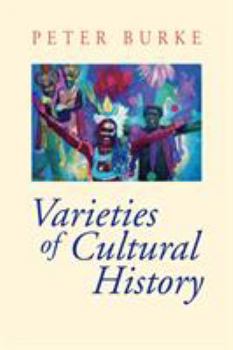Varieties of Culture History
Select Format
Select Condition 
Book Overview
In this collection of essays, of which four are published here for the first time, Peter Burke explores the theory and practice of what is called "new cultural history." He focuses on the varieties of cultural history which have emerged since the writings of Jacob Burckhardt and Johan Huizinga. No new orthodoxy has emerged to replace the classic model, Burke suggests, despite the importance of innovative approaches inspired by social and cultural anthropology. After discussing the origins and identity of cultural history, Burke explores the social history of dreams and the relation between history and social memory. He presents five case studies addressing topics in the history of early modern Italy. Each is located on the frontiers of cultural history--between learned and popular culture, between the public and the private spheres, and between the serious and the comic. Burke then turns to the encounter between Europe and the New World and to the phenomenon of cultural translation in the etymological, literal, and metaphorical senses of the term. He concludes with two theoretical investigations: one on the history of mentalities and one which asks why cultural history seems doomed to fragmentation.
Format:Paperback
Language:English
ISBN:0801484928
ISBN13:9780801484926
Release Date:August 1997
Publisher:Cornell University Press
Length:256 Pages
Weight:0.95 lbs.
Dimensions:0.8" x 6.0" x 9.0"
Age Range:18 years and up
Grade Range:Postsecondary and higher
Customer Reviews
1 rating
Excellent synopsis of cultural history
Published by Thriftbooks.com User , 24 years ago
Peter Burke is professor of Cultural History at the University of Cambridge and is certainly one of the most prominent figures in cultural history today. This volume is a selection of his essays, most of them previously published, which will certainly bring students up to date on the current practice of cultural history. There are essays on the origins of cultural history, the cultural history of dreams, chivalry in the New World, as well as an excellent discussion of the strengths and weaknesses of the history of mentalities. In another essay Burke takes the cultural concept of carnival (one he previously dealt with in his excellent "Popular Culture in Early Modern Europe") and explores it in the context of Brazilian and African societies. Although five of the twelve essays focus on the author's area of specialization --Renaissance and Early Modern Italy-- there is much broader knowledge to be gained from the volume. Burke succinctly narrates the evolution of this type of history, demonstrating the relationship between historians such as Bloch, Burckhardt and Huizinga to the social anthropologists' search for collective representations (Durkheim and Lucien Lévy-Bruhl), and ending with the myriad ways in which the discipline is practiced today. Although the book is great, I do think it would have benefited from a more thorough discussion of the "new" cultural historians such as Lynn Hunt et al.





